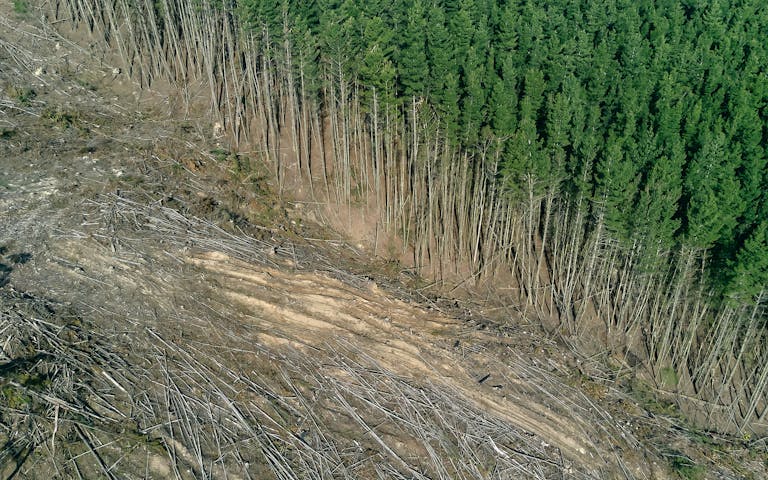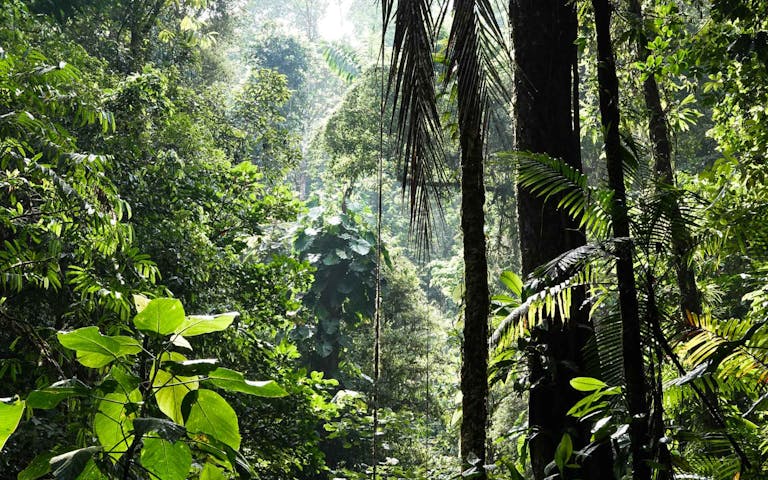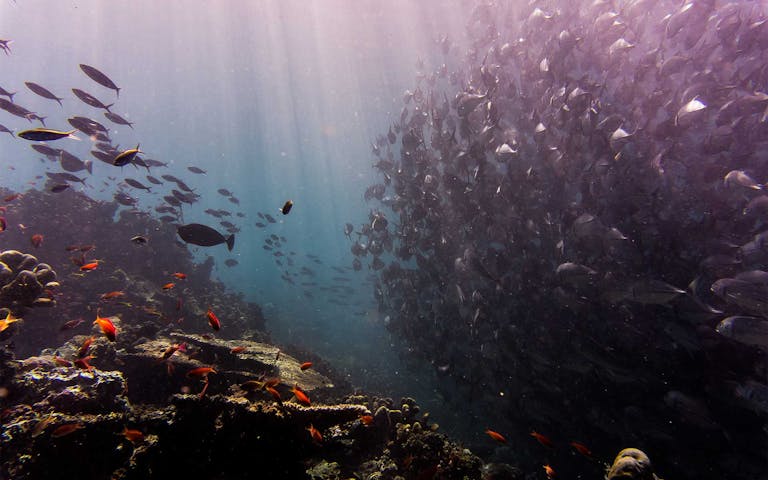
Corporate responsibility
AXA & biodiversity
We view the biodiversity challenge as a natural extension of our climate efforts.
We view the biodiversity challenge as a natural extension of our climate efforts.
Biodiversity loss endangers ecosystemic services, which threatens both society and businesses that depend on them, and in turn investors and insurers that rely on a well-functioning economy. We view the biodiversity challenge as a natural extension of our climate efforts. Indeed, climate change is severely compounding the destruction of ecosystems all around the world, adding pressures related to drought, ocean acidification, more intense natural catastrophes, etc. This is why in 2018 we publicly decided to investigate how biodiversity loss is impacting society and how we can act both as an insurer and an investor. We have made progress since then.
One may wonder why a large insurance company, which is also a large institutional investor, is involved in biodiversity loss and nature protection. AXA does not produce plastic waste, pollute soil, or significantly deplete natural resources. Our direct environmental footprint is rather light. Nonetheless we have committed to act on biodiversity loss in 2018 and have made progress since. Before we develop these initiatives, it is important to explain current concerns with biodiversity loss, and its potential connections to AXA’s business.
The biodiversity crisis
When we talk about biodiversity these days, unfortunately it is because it is being undermined. There is an alarming decline in species number: according to the WWF Living Planet Index, biodiversity has decreased by 60% in four decades. Renowned scientists even speak of the sixth extinction event, the last one being the period when the dinosaurs disappeared.
According to the Intergovernmental Science-Policy Platform on Biodiversity and Ecosystem Services (IPBES), the drivers of biodiversity loss are climate change, invasive species, overexploitation of natural resources (intensive agriculture, overfishing), soil pollution and urbanization and causes of the global biodiversity crisis and the opportunities to address them are tightly linked to the ways nature is valued in political and economic decisions at all levels.

Species are disappearing at a fast rate, endangering these services and threatening human integrity. Whilst this situation has not yet attracted as much political and media attention as the equally challenging concerns related to climate change, more and more analyses are starting to highlight the rate of species decline and its inherent threat to human welfare.
So what’s the connection to AXA’s business?
Nature produces elements essential to human activity and to our very survival, from food and shelter to medicines’ active ingredients. Moreover, diverse ecosystems are key to tackling climate change, as flourishing forests and well-preserved oceans absorb carbon emissions. Conversely, climate change accelerates biodiversity loss, creating a vicious circle.
Our dependence on diverse ecosystems to thrive, if not survive, is therefore not to be doubted. The implicit contributions of each species in our economies are also far-reaching: their roles can be seen as services
provided free of charge by nature – nature truly works
for us. For example, artificial pollination would cost an estimated 153 billion euros per year, generating labour and technological costs far exceeding any economic viability.
The potential loss of key ecological services endangers not only populations but also certain businesses that depend on them and can therefore become a concern for investors. Investors’ ability to understand and map these potential risks would enable them to identify opportunities and in doing so, help support solutions rather than environmentally unsustainable business practices.
In short, biodiversity loss endangers ecosystemic services, which threatens both society and businesses that depend on them, and in turn investors and insurers that rely on a well-functioning economy. Finally, it appears that the destruction of natural habitats may have been the starting point of the Covid-19 crisis which will make it into history books. That alone should warrant our full attention.

A natural extension of our climate strategy
We view the biodiversity challenge as a natural extension of our climate efforts and the next frontier of sustainable finance. As a company which, over the past 7 years, took important decisions in the fight against climate change, we are convinced that the preservation of biodiversity requires an equally broad collective commitment from all stakeholders: from private sector actors, including financial institutions, to governments, NGOs and civil society.
What have we done about it?
Impact of AXA’s own operations on biodiversity
As there are not yet commonly accepted and well-developed tools to measure biodiversity performance, biodiversity impact measures can diff er depending on the methodological choices. In the spirit of transparency and to encourage discussion of biodiversity metrics, AXA publishes the following analysis as a demonstration of the possibilities, and limitations, of current metrics relevant to biodiversity for corporate issuers. AXA continues to engage with peers and other key stakeholders in the TNFD Metrics and Targets Working Group to develop further guidance for all key stakeholders.
The pilot test incorporated available financial data and covered AXA’s full value chain including scopes 1, 2, and 3. Drawing on AXA’s existing environmental reporting and management, AXA was able to use data including the following:
- scope 1: direct impact from the company’s own on-site operations (fuel consumption, surfaced occupied, water consumed, etc.);
- scope 2: indirect impact from the production of non-fuel purchased energy (electricity, steam, heating, and cooling);
- scope 3: indirect impacts, not resulting from the company’s operations but from sources not owned or controlled by the company, upstream of its activities (purchase of IT equipment, office equipment, car fleet, catering, employee commuting, etc.).
Where data was not available, conservative assumptions were used to not underestimate the pressures of certain activities. The pilot analysis assesses AXA’s impact on biodiversity using scientific models to convert activity flows into measurable biodiversity pressures. This enables various stakeholders to share a common language to express the types of pressures and intensity of biodiversity loss per activity.
Based on the activities measured in 2021, this pilot confirmed the nexus between climate change and biodiversity loss and affirmed AXA’s commitments to reducing AXA’s GHG footprint from its own operations. This exercise provides a valuable insight into the categories of metrics currently available to corporates. It can provide guidance as to a company’s main impacts on biodiversity. The same biodiversity relevant metrics, when reported in a transparent and standardized manner, can ultimately be used by an investor such as AXA at an aggregate level.
To measure the impact of AXA’s investments on biodiversity, AXA selected an innovative biodiversity-specific data measurement tool developed by Iceberg Data Lab (IDL) and iCare&Consult called the corporate biodiversity footprint
(CBF). The CBF aims to identify, at a portfolio level, the biodiversity-related impact of an investor’s investment activities. The CBF measures impacts by the biodiversity loss associated with the pressures on biodiversity generated by an investee company’s economic activities across their value chain. The value chain approach enables an analysis of a company’s biodiversity footprint generated by a company’s activities across three scopes, using a similar approach to the three GHG scope definitions.
AXA launched its third Impact Investment
fund during the 2019 G7 meetings, with a strong focus on biodiversity protection. It invests to protect natural capital, promote resource efficiency and improve the resilience of vulnerable communities to the effects of climate change and biodiversity loss. The Fund was awarded the Best Impact
initiative for ESG in the 2019 Sustainable Investment Awards.
The Fund is making good on its promise to support credible and investable solutions that deliver positive environmental outcomes alongside market-rate financial returns. Examples include investments in sustainable agroforestry and cocoa production in Madagascar with strict biodiversity protection criteria, as well as supporting projects that address the effect that extreme weather due to climate change is having on the availability of water, critical habitats and biodiversity. In 2020, Impact Investment Fund Climate & Biodiversity size doubled to US$350 million.
In September 2021, AXA IM Alts, a global leader in alternative investments with over €190 billion of assets under management, announced the launch of a new Natural Capital strategy, designed to support nature-based solutions. The launch of this new strategy, initially reserved for AXA Group investors which have provided an initial €500m commitment, represents the next step in the evolution of AXA IM Alts’ current natural capital offering and underpins AXA IM Alts’ broader strategic plans to further extend its efforts to address climate change and biodiversity loss.
This commitment forms part of AXA Group’s €1.5 billion commitment to protect and sustainably manage forest ecosystems, and this latest investment will further contribute to its target to remove or avoid up to 25 million tonnes of carbon dioxide each year.
Building off AXA IM Alts’ existing expertise within the sector, the Natural Capital Strategy will focus on financing activity that ensures that vulnerable or high value natural habitats are protected from deforestation, including both financing to address the drivers of deforestation and to improve forest conservation efforts, quantified through the issuance of voluntary carbon credits. The portfolio will combine strategic equity investments, with stakes in companies supporting the natural capital ecosystem in local markets, the provision of carbon solutions, and direct project financing.
In our Climate and Biodiversity Report 2022, we published for first time an analysis of the impacts of AXA’s investments and operations on biodiversity, in line with Article 29
, and building on the Beta version of the Taskforce on Nature-related Financial Disclosures (TNFD).
These analyses reveal that progress has been made to help translate nature into a language the financial sector can understand, but that ongoing work is still required. By partnering with Iceberg Data Lab and working with peers, AXA is committed to the development of decision-useful metrics.

AXA has identified specific actions to address biodiversity loss with a particular focus on two of the four realms: land (via AXA’s actions on forests), and the ocean.
AXA, through its investments, owns over 250 forests, with half of these classified as protected areas. We have committed to establish a sustainable strategy for the management of our forest assets as well as to monitor and alert in case of destruction of insured areas. We will identify natural habitats and monitor their evolution, devote 3% of the exploitable area to natural development, limit clear-cutting to 4 hectares, and open some forests to nature protection organizations.
Marine stewardship is another area where progress can be done. AXA Climate, in partnership with AXA XL, is providing risk capacity for coral protection against tropical cyclones at four sites along the Mesoamerican reef in Mexico, Belize, Guatemala, and Honduras. The pay-out will be used by the client to do restoration work such as cleaning debris and attaching corals back to the reef. AXA is scaling up this product in 2022 and broadening the coverage to other types of coastal ecosystems, including mangroves.

The Oceana and UN Environment Program Finance Initiative (UNEP FI) Insurance Industry Statement Against Illegal, Unreported, and Unregulated (IUU) Fishing
AXA signed this statement in 2017. It includes best practices about which vessels to insure. AXA’s Marine Underwriting Rules and Guidelines now require vessels to be checked against IUU fi shing blacklists. This assesses whether fishing vessels have the proper licenses and checks that they don’t have periods when their tracking systems are inactive. In addition, AXA XL now requires International Maritime Organization (IMO) numbers for all fi shing vessels and refrigerated cargo vessels that it insures. IMO numbers help ensure effective identification of vessels.
At COP26, AXA XL launched the Coastal Risk Index (CRI). This is an innovative tool that maps current and future flood hazards resulting from climate change. For the first time, it integrates the protective benefits of coastal ecosystems into insurance risk models. The CRI assesses coastal flooding in the context of climate change by comparing scenarios with and without coastal ecosystems, such as coral reefs and mangroves. This helps build the case for nature-based solutions. The CRI illustrates the: – potential benefits ecosystems provide to assets and populations in different flooding scenarios; and – estimated value of restoring lost mangroves due to their flood reduction benefits through new global mangrove maps. The CRI is designed to be used by communities, policymakers, insurers, investors, and development banks to assess current and future flood risk and calculate the resilience value of ecosystems. This will thus improve how they measure risk and lead to more robust resilience strategies that catalyze the protection of coastal natural assets.
AXA is a co-chair of the Ocean Risk and Resilience Action Alliance (ORRAA). This was formed following the 2018 Ocean Risk Summit. ORRAA brings together the finance and insurance sectors along with governments, non-profits, and stakeholders to:
- drive investment in marine and coastal natural capital;
- reduce ocean and climate risks; and
- build resilience in coastal communities.
AXA supports the ORRAA BackBlue Ocean Finance Commitment. This initiative, founded by the European Commission and other institutions, provides key principles to promote the implementation of Sustainable Development Goal 14 (Life Below Water) and set out ocean-specific standards.
AXA became a signatory of the Poseidon Principles for Marine Insurance (PPMI) in 2022. This initiative was developed in an effort spearheaded by global insurance institutions in collaboration with leading industry player and maritime expert support. It recognizes the role of insurers in promoting responsible environmental stewardship throughout the maritime value chain, hence providing tools to foster collaboration with clients, gain insight to enhance strategic decision-making, and address the impacts of climate change. AXA has also committed to several public pledges that focus on biodiversity loss since 2018:
- Act4Nature,
Business for Nature
and theFinance for Biodiversity
initiative; and - Financial Sector Commitment on Eliminating Agricultural Commodity-Driven Deforestation at COP26 (
DEFRA Pledge
); - AXA also supported the Joint Declaration on the creation of a global coalition for blue carbon at the One Ocean Summit, held in Brest in February 2022.
As of 2021, AXA Research Fund had committed €250m to fund science. It has funded over 670 research projects in 38 countries, including over 230 projects focusing on climate and environment. The Fund actively supports academic research on biodiversity risks. The Fund also published a research paper, Biodiversity at Risk
, which highlights the interdependencies between nature, climate change, the economy and security, to help raise public awareness and support enlightened decision making.
In 2021, the Fund highlighted its support for climate and nature’s resilience. With climate change and infrastructure development undeniably adding to the degradation of coastal ecosystem such as mangroves and coral reefs, the Fund held a Coastal Resilience and the Role of Nature Based Solutions webinar attended by leading academic, government and industry experts to discuss:
- the challenges of coastal risk; and
- the opportunities to accelerate investment in nature-based solutions.
Finally, for us to refine and extend these initiatives together with renowned experts in this field, in 2020 we have signed a 3 years partnership with the WWF to tackle biodiversity risks. The partnership includes support on crafting the TNFD as well as biodiversity impact metrics and other policy developments related to deforestation or the oceans.
A call to COP15 action
The Paris Agreement at COP21 sent a clear political signal to the private sector that climate action was needed. With respect to biodiversity, AXA can contribute through voluntary initiatives such as the Business for Nature
and Finance for Biodiversity
initiatives. However, against the background of a competitive market environment, adequate rules and guidance from governments are key for cutting-edge issues where the playing field is not yet level.
Government adoption of international science-based biodiversity targets at COP15 is the surest way to provide this much needed clarity.
General aspirations will not be sufficient to achieve tangible outcomes. Clear targets will help companies, financial institutions, and civil society to translate these nature conservation objectives into robust long-term business strategies. Clear steps have already been made in this direction. In October 2021, the first part of COP15 was held in Kunming, China. The Kunming Declaration, agreed at this meeting, identifies the role of finance in addressing biodiversity loss. Like the Paris Agreement, the Kunming Declaration identifies the need to align all financial flows in support of the conservation and sustainable use of biodiversity
(Article 13).
